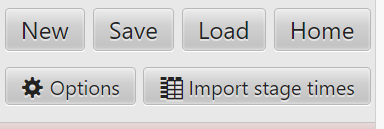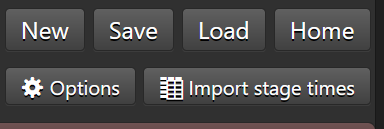Importing stage times
Should you already have the stage times available, you can save yourself a significant amount of time by importing them all in one go.
If your stage times are currently in a spreadsheet then it's likely that they won't too need much tweaking beforehand.
The importer expects 5 columns of information for each performance: Act Name, Start Time, End Time, Stage Name, Day Number.
The data can be tab or comma separated.
End Time can be left blank, and if so the performance will automatically be treated as start-only.
Tutorial
In this example I will be using a reformatted version of the data from the My first planner tutorial.
For ease of copy/pasting the times, I've separated the data into two parts. This is the basic event info:
Event Name: My cool annual event 2025
Start Date: 7th June 2025
Duration: 1 day
Times: 16:00 to 20:00
And here are the times:
Small Local Group 16:15 17:00 Main Stage 1
Up and Coming Act 17:30 18:30 Main Stage 1
Big Older Act 19:00 20:00 Main Stage 1
Another Local Group 16:30 17:00 2nd Stage 1
Cool Local Group 17:25 18:00 2nd Stage 1
Cool DJ 18:20 20:00 2nd Stage 1
Click the Import Stage Times button at the top of the left side bar.


And you'll be greeted with a window that looks a bit like a spreadsheet.
Select the cell in the top left, and paste the stage times.


Then just click the Import button at the bottom.
It's that simple.
The Import stage times window
Top


At the top of the window there's a way of quickly changing the event start and end times, along with 2 buttons that we won't worry about in this article.
Advanced: Token Parser can help you import times that are formatted differentlyBelow that you'll see 5 named columns: Act Name, Start Time, End Time, Stage Name, Day Number.
Re-ordering columns
You can re-order the columns to match your data by dragging them around.

It's a good idea to do any re-ordering before pasting your stage times.
Hyphen separated times
If you keep the Start Time & End Time columns next to each other then the importer can automatically split stage times that are separated by a hyphen, like so:
Small Local Group 16:15 - 17:00 Main Stage 1
This feature can be disabled by toggling the Split times separated by hyphens option at the bottom of the window.
Bottom


The bottom of the window has quite a few different buttons and inputs.
If your stage times use the 12-hour clock, without denoting AM/PM, then the Fix 12-hour times without meridiems (am/pm) button will help remove the ambiguity.
For example, an event running from 11am to 11pm, with performance times that look like 7:30, 2:45, and 9:00 will get converted to 19:30, 14:45, and 21:00.
Test it yourself with the folllowing:
Pieman 7:30 9:00 Main Stage 1
Should your event run long enough that a time could be valid as either AM or PM, then you will have to resolve the issue manually.
On paste/drag&drop
This section can be ignored, as the defaults should be fine regardless of your input.
Import options
| Name | Description |
|---|---|
| Convert act names to Proper Case | Could be a handy time saver if the act names are all given IN CAPITAL LETTERS. |
| Treat bracketed text at the end of names as labels | Example: Name (label) Multiple labels work too: Name (label 1)(label 2) |
| Ignore errors | Allows you to try to import invalid stage times. They will probably be ignored, but the rest of the data will be imported |
| Import mode | Description |
|---|---|
| Default Import mode | The new recommended import function. Please report any issues you have with it. |
| Classic (Clobber) | This is the long standing import behaviour. It's perfectly fine to use, but does churn data up behind the scenes. It could lead to user selections referencing the wrong performance. Use this is you have issues with the other methods! |
| Amend only (No deletions) | Merge this data with the current planner upon importing. This feature is quite naive, and does not remove anything! |
Importing non-performance data
To facilitate my effort of importing data for Glastonbury Festival I added the ability to import stage closures and compères.
They use specially crafted Act Names to determine how to handle them. The rest of the performance data is processed normally, to position them correctly.
Stage Closures
Not the most useful of things, and yet I added them anyway.
These closures cannot be selected, or interacted with by users.
They're really just for saying "Hey, you can't be in the area during this time" as a scheduled event, but other people have used them for global site events, like fireworks.
You might find them handy, too.
[!SC:]
[!SC:Text goes here]
Text is optional
Stage Information (Compères)
Whilst Stage Info during a day may feature age restriction changes, I have only added support for setting a compère.
If this is a limitation that impacts you then please do get in touch.
Stage Info does not require, or make use of, any provided End Time.
[!SI:]
This is an empty Stage Info, you can easily click in the creator to adjust the settings.
A stage info without a compère or age restriction will not be displayed to users viewing a planner.
[!SI:Mr Speaks-well]
Creates a Stage Info with the given text as the Compère.
Usage examples
[!SC:Siesta] 13:00 14:00 Small Tent 1
[!SC:] 12:00 12:15 Small Tent 1
[!SI:Brian Blessed] 12:15 Small Tent 1
Barry White 12:15 13:00 Small Tent 1